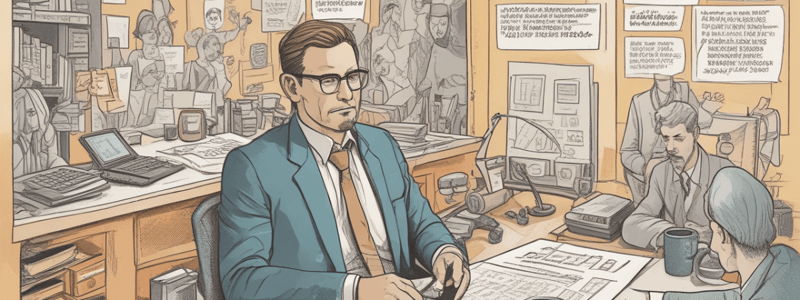Podcast
Questions and Answers
What was Harris's initial perception of Karen after she started working for him?
What was Harris's initial perception of Karen after she started working for him?
- That she was struggling with addiction.
- That she was a super-reliable straight arrow. (correct)
- That she was lazy and unmotivated.
- That she was dishonest.
What triggered Harris's anger towards Karen?
What triggered Harris's anger towards Karen?
- Karen's request for a raise.
- Karen's mistakes in managing his files.
- Harris missing an important sales meeting. (correct)
- Karen's chronic lateness and frequent absences.
What was Karen's reason for her poor performance at work?
What was Karen's reason for her poor performance at work?
- She was struggling with addiction.
- She was not capable of performing her duties.
- She was dealing with a personal issue at home. (correct)
- She was unhappy with her job.
How did Harris initially react to Karen's poor performance?
How did Harris initially react to Karen's poor performance?
What did Harris's previous assistant struggle with?
What did Harris's previous assistant struggle with?
What did Harris arrange for Karen after he found out about her situation?
What did Harris arrange for Karen after he found out about her situation?
Why do humans tend to typecast others?
Why do humans tend to typecast others?
What happens when people are in survival mode?
What happens when people are in survival mode?
What happens when people typecast others based on patterns from their families?
What happens when people typecast others based on patterns from their families?
What happens to people's prejudices in times of common physical crisis?
What happens to people's prejudices in times of common physical crisis?
Harris immediately fired Karen after finding out about her situation
Harris immediately fired Karen after finding out about her situation
Karen's son lost an arm permanently due to the accident
Karen's son lost an arm permanently due to the accident
Humans are capable of dealing with the 'hurry up and respond' information all at once in modern life
Humans are capable of dealing with the 'hurry up and respond' information all at once in modern life
Typecasting can help people make clear and objective decisions in work situations
Typecasting can help people make clear and objective decisions in work situations
People's prejudices disappear completely after common physical crises
People's prejudices disappear completely after common physical crises
Flashcards are hidden until you start studying
Study Notes
Typecasting at Work
- Typecasting can occur when an individual is quickly judged based on their physical traits and behavior, leading to firm judgments within seconds of meeting.
- This tendency is exacerbated by demanding jobs, modern life, and the constant flow of information, causing humans to live in permanent fight-or-flight survival mode.
- Typecasting can also occur when personal qualities of people from the past are unconsciously transferred onto others, matching new people with familiar patterns instead of judging them in their own right.
The Case of Harris and Karen
- Harris, an executive vice president, misjudged his assistant Karen, assuming she was "lazy", "unmotivated", and "flaking out" due to her changed behavior after a month of excellent work.
- Karen was actually dealing with her three-year-old son's diagnosis with leukemia, but didn't feel safe to tell Harris due to his busy and grumpy demeanor.
- Harris's misjudgment stemmed from his past experiences with other assistants and his own family dynamics, including his younger brother's struggle with drugs.
Consequences of Typecasting
- Typecasting can lead to quick-tempered and anxious behavior, preventing clear and objective decision-making.
- It can cause people to make decisions based on emotion rather than fact, eliminating the possibility of doing their best work.
- Typecasting can also lead to a cycle of reinforcing bad behavior, as seen in the case of Harris and Karen, where their images of each other reinforced their negative actions.
Overcoming Typecasting
- To succeed, it's essential to avoid jumping to conclusions and instead, take the time to understand the situation and people involved.
- In moments of common crisis, people tend to throw away their typecasts and come together to help one another survive and recover.
Typecasting at Work
- Typecasting can occur when an individual is quickly judged based on their physical traits and behavior, leading to firm judgments within seconds of meeting.
- This tendency is exacerbated by demanding jobs, modern life, and the constant flow of information, causing humans to live in permanent fight-or-flight survival mode.
- Typecasting can also occur when personal qualities of people from the past are unconsciously transferred onto others, matching new people with familiar patterns instead of judging them in their own right.
The Case of Harris and Karen
- Harris, an executive vice president, misjudged his assistant Karen, assuming she was "lazy", "unmotivated", and "flaking out" due to her changed behavior after a month of excellent work.
- Karen was actually dealing with her three-year-old son's diagnosis with leukemia, but didn't feel safe to tell Harris due to his busy and grumpy demeanor.
- Harris's misjudgment stemmed from his past experiences with other assistants and his own family dynamics, including his younger brother's struggle with drugs.
Consequences of Typecasting
- Typecasting can lead to quick-tempered and anxious behavior, preventing clear and objective decision-making.
- It can cause people to make decisions based on emotion rather than fact, eliminating the possibility of doing their best work.
- Typecasting can also lead to a cycle of reinforcing bad behavior, as seen in the case of Harris and Karen, where their images of each other reinforced their negative actions.
Overcoming Typecasting
- To succeed, it's essential to avoid jumping to conclusions and instead, take the time to understand the situation and people involved.
- In moments of common crisis, people tend to throw away their typecasts and come together to help one another survive and recover.
Studying That Suits You
Use AI to generate personalized quizzes and flashcards to suit your learning preferences.




